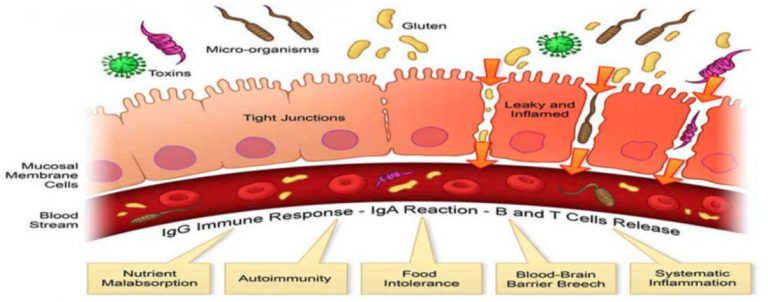
From the name leaky gut syndrome, more formally known as increased intestinal permeability, it’s reasonable to assume this affliction only affects the digestive system. But, in reality, it can lead to many other health disorders.
Leaky gut syndrome still remains a bit of a medical mystery but researchers are focusing on the cause of food allergies, low energy, joint pain, thyroid disease, autoimmune conditions and slow metabolism thinking they could be linked to the progression of leaky gut symptoms. They have identified a protein called zonulin, the only known regulator of intestinal permeability. When it’s activated, it can lead to leaky gut.
The two factors trigger the release of zonulin. Bacteria in the intestines and gluten, which is a protein found in wheat and other grains. GMO grains are cultivated with high levels of gluten which makes it more amenable to all kinds of food processing.
What Is Leaky Gut Syndrome?
Think of the lining of your digestive tract like a fine mesh net with extremely small holes that’s designed to only allow specific substances to pass through. This gut lining works as a barrier keeping out larger particles that can damage your system.
When increased intestinal permeability more often referred to as leaky gut occurs, the ‘net’ in the digestive tract is damaged, which causes even bigger holes to develop. This means things that normally should not pass through, now have a gateway and that’s where the real trouble starts.
Things that can pass through include proteins like gluten, bad bacteria and undigested foods particles. Or toxic waste from the inside of your intestinal wall which can then get into your blood stream causing an immune reaction.
This leads to inflammation throughout your system which can trigger symptoms, such as:
- Bloating
- Food sensitivities
- Thyroid conditions
- Fatigue
- Joint Pain
- Headaches
- Skin conditions like rosacea and acne
- Digestive Issues
- Weight Gain
The good news is some foods can help the healing process of leaky gut; foods that help repair and rebalance the gut. But first, the foods that cause the damage has got to go.
Eliminating processed foods which include refined sugar and GMO grains – think refined cereals, commercial bread, industrial processed meats and most dairy have got to go.
Recovery Nutrition
Recovery nutrition is food that can help with the healing process. By replacing the food that has caused the damaged with nutritional rich foods, the body’s healing mechanism can work more effectively.
Premium bone broth is a good example. It contains collagen and amino acids like proline and glycine which can help support damaged cell walls. But be careful not to purchase commercially processed bone broth which can be high in sodium and low in nutrients.
Probiotics and fermented vegetables help restore balance in the gut. They contain organic acids that balance intestinal pH and probiotics to support the gut. Sauerkraut, kimchi and kvass are excellent sources.
Foods that have omega-3 fats are beneficial. Anti-inflammatory foods like grass-fed beef, lamb and wild-caught fish.
And coconut products are good for the gut. The MCFA’s in coconut are easier to digest than other fats, so they work well for leaky gut. Coconut kefir contains probiotics that support your digestive system.
Sprouted seeds also help. Chia seeds, flaxseeds and hemp seeds that have been sprouted are great sources of fiber that help support the growth of beneficial bacteria. But it’s important to remember if you suffer from severe leaky gut, you may need to start out getting your fiber from steamed vegetables and fruit.
As always, should you suspect that you have leaky gut syndrome, check with your health care provider to discuss the recovery nutrition that works for you.
References:
https://www.ncbi.nlm.nih.gov/pmc/articles/PMC1856434/
https://www.ncbi.nlm.nih.gov/pmc/articles/PMC2886850/
https://pubmed.ncbi.nlm.nih.gov/21248165/
https://www.ncbi.nlm.nih.gov/pmc/articles/PMC4253991/
https://pubmed.ncbi.nlm.nih.gov/10980980/